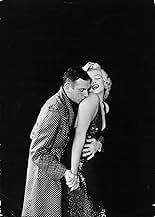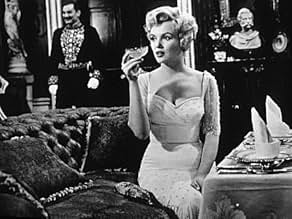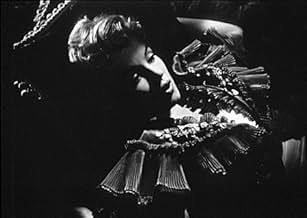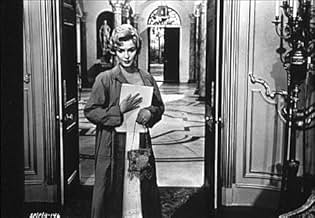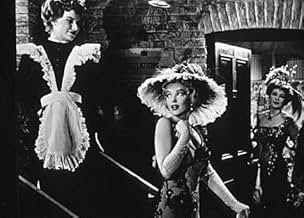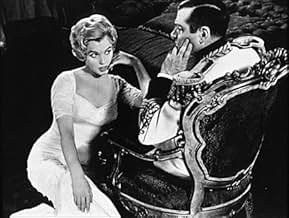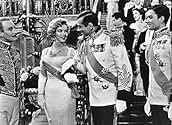PUNTUACIÓN EN IMDb
6,4/10
9,4 mil
TU PUNTUACIÓN
Una corista americana se ve envuelta en una intriga política cuando el príncipe regente de un país extranjero intenta seducirla.Una corista americana se ve envuelta en una intriga política cuando el príncipe regente de un país extranjero intenta seducirla.Una corista americana se ve envuelta en una intriga política cuando el príncipe regente de un país extranjero intenta seducirla.
- Nominado a 5 premios BAFTA
- 2 premios y 6 nominaciones en total
Andreas Malandrinos
- Valet with Violin
- (as Andrea Melandrinos)
Argumento
¿Sabías que...?
- CuriosidadesMarilyn Monroe and Sir Laurence Olivier had trouble filming together. He would often get angry at her forgetting lines or being late to the set. Monroe was furious one day while filming, when Laurence told her to "just be sexy".
- PifiasNorthbrook refers to the foxtrot, a dance that didn't premiere until 1914, three years later.
- Citas
Elsie Marina: [having learned the details of the Regent's "party"] You know, there's a word for what you are and it's not Deputy Head of the Far Eastern Department.
- ConexionesFeatured in ABC Stage 67: The Legend of Marilyn Monroe (1966)
- Banda sonoraThe Duke of York
(uncredited)
Traditional
Arranged by Cecil H. Jaeger
Reseña destacada
This is one of those movies where the set pace of events are known to the audience, so that when it reaches it's conclusion we are aware that what we (the audience) might wish can happen for the two leads is not going to be possible.
It is 1911, and we are in London for the coronation week of King George V and his wife Queen Mary. If you have read THE GUNS OF AUGUST by Barbara Tuchman, this event was the last great occasion for the appearance of all the crowned heads of Europe prior to the destruction (in seven years) of three leading houses (Hohenzollern, Romanov, and Hapsburg) due to World War II. Despite the survival of several other monarchies in Scandanavia, the Benelux countries, and (in revival) in Spain, the three lost ones of 1918 are now joined by the lost ones of the Balkans. And it is the Balkans that is the spot that Laurence Olivier's Carpathia is located in.
In reality Carpathia is part of Hungary and Roumania. Part of it (Transylvania) is well known through the story of Dracula. But for the sake of this story, it is an independent kingdom like Roumania, Bulgaria, and Serbia at that time. Prince Charles, the Regent of Carpathia, is running the country until his son King Nicholas comes of age in 18 months. So sometime in 1913 Nicholas will start ruling in his own name, and he is pro-German. Charles is pro-English. This would be unimportant but Carpathia has the fourth best army in Europe, so if it shifts it's position it may cause an unbalanced international situation that may lead to a general war.
Charles (Laurence Olivier) and Nicholas (Jeremy Spenser) and Nicholas' grandmother the Queen Dowager (Sybil Thorndike) are attending it. Charles is being monitored by Foreign Office official Northbrook (Richard Wattis), who wants to make sure the Regent is happy on his visit. Charles attends a show, and decides that one of the minor actresses, Elsie Mariner (Marilyn Monroe) should be invited to the Carpathian Embassy for a late supper. Despite misgivings Northbrook arranges for Elsie to show up.
But Elsie (although welcomed by the amorous Charles) finds she has to watch as he spends time talking about a political problem at home - the capture of one of Nicholas' clique of pro-German friends who has been caught with some compromising documents that would hurt the King. Charles plans to squeeze the arrested man for all the information he can get about Nicholas' schemes, but admits to his telephone informant that he is more likely to have problems about the situation from President Taft and his meddlesome Americans than from anyone else. Elsie, who overhears this, is angered (she is an American). The result is a moment that most fans of Monroe don't recall. They remember that she sang Happy Birthday to President Kennedy once, but here she toasted President William Howard Taft with champagne.
Charles finds Elsie not like other women he has had one night stands with. First, he never gets to first base with her (she gets drunk and falls asleep, despite his varied attempts to get her into the right mood and position). Second, she does not leave as he hopes, but keeps getting stuck deeper and deeper into the embassy and the Royal Family's world (even attending the coronation at Westminster Abbey). She is there for the embassy ball, and she even has a second night where she is in control of the trysting. Charles married his late wife and did his duty for her and her country, but he finds he loves Elsie. But he is leaving at the start of the third day for Carpathia with his mother and son, and has another 18 months of duty before he is free. And Elsie has 18 months left to her play contract. They do say "au revoir" at the end, but will they get back together. For they can't until 1913, the start of the Second Balkan War, and one of the steps that brought World War I to fruition.
The film was based on a play, THE SLEEPING PRINCE by Terence Rattigan, one of the best dramatists of England in the 20th Century (THE WINSLOW BOY, THE BROWNING VERSION). A practitioner of what Shaw called "the well-made play", Rattigan made sure his plays were entertaining and intelligent, and his characters were realistic. But in the original play Elsie was not American, but English, and was played by Vivien Leigh. Olivier had thought of filming the play with Leigh, but her illness interfered. Monroe was available, and was big box-office. Olivier was to direct her, his first film direction assignment since RICHARD III. She gave so much difficulty to him, he did not direct another film until 1970 when he did Checkov's THE THREE SISTERS.
But the film has it's period charms and a literate script. It does capture the brittle social and diplomatic world of 1911 quite well. Olivier's Regent is not as great a part as Richard III or Hamlet or Othello, but he does have a grasp on the man's pride and sense of self-importance. Monroe does come across as intelligent regarding family matters (i.e. the Regent and his son, the King), as well as an understanding woman. Wattis shoulders the dignity of the foreign office ruffled by the crazy duties he has to shoulder that week. Sybil Thorndike, with her fears of anarchists, and belief that Elsie is a close friend of Sarah Bernhart, is in a peculiar portion of the universe. She carries off an eccentric royal type that is light years away from her aged, vicious crone in BRITTANIA MEWS. It was not a major film - certainly not in the same category as the three Olivier Shakespeare films, but it is a good minor one.
It is 1911, and we are in London for the coronation week of King George V and his wife Queen Mary. If you have read THE GUNS OF AUGUST by Barbara Tuchman, this event was the last great occasion for the appearance of all the crowned heads of Europe prior to the destruction (in seven years) of three leading houses (Hohenzollern, Romanov, and Hapsburg) due to World War II. Despite the survival of several other monarchies in Scandanavia, the Benelux countries, and (in revival) in Spain, the three lost ones of 1918 are now joined by the lost ones of the Balkans. And it is the Balkans that is the spot that Laurence Olivier's Carpathia is located in.
In reality Carpathia is part of Hungary and Roumania. Part of it (Transylvania) is well known through the story of Dracula. But for the sake of this story, it is an independent kingdom like Roumania, Bulgaria, and Serbia at that time. Prince Charles, the Regent of Carpathia, is running the country until his son King Nicholas comes of age in 18 months. So sometime in 1913 Nicholas will start ruling in his own name, and he is pro-German. Charles is pro-English. This would be unimportant but Carpathia has the fourth best army in Europe, so if it shifts it's position it may cause an unbalanced international situation that may lead to a general war.
Charles (Laurence Olivier) and Nicholas (Jeremy Spenser) and Nicholas' grandmother the Queen Dowager (Sybil Thorndike) are attending it. Charles is being monitored by Foreign Office official Northbrook (Richard Wattis), who wants to make sure the Regent is happy on his visit. Charles attends a show, and decides that one of the minor actresses, Elsie Mariner (Marilyn Monroe) should be invited to the Carpathian Embassy for a late supper. Despite misgivings Northbrook arranges for Elsie to show up.
But Elsie (although welcomed by the amorous Charles) finds she has to watch as he spends time talking about a political problem at home - the capture of one of Nicholas' clique of pro-German friends who has been caught with some compromising documents that would hurt the King. Charles plans to squeeze the arrested man for all the information he can get about Nicholas' schemes, but admits to his telephone informant that he is more likely to have problems about the situation from President Taft and his meddlesome Americans than from anyone else. Elsie, who overhears this, is angered (she is an American). The result is a moment that most fans of Monroe don't recall. They remember that she sang Happy Birthday to President Kennedy once, but here she toasted President William Howard Taft with champagne.
Charles finds Elsie not like other women he has had one night stands with. First, he never gets to first base with her (she gets drunk and falls asleep, despite his varied attempts to get her into the right mood and position). Second, she does not leave as he hopes, but keeps getting stuck deeper and deeper into the embassy and the Royal Family's world (even attending the coronation at Westminster Abbey). She is there for the embassy ball, and she even has a second night where she is in control of the trysting. Charles married his late wife and did his duty for her and her country, but he finds he loves Elsie. But he is leaving at the start of the third day for Carpathia with his mother and son, and has another 18 months of duty before he is free. And Elsie has 18 months left to her play contract. They do say "au revoir" at the end, but will they get back together. For they can't until 1913, the start of the Second Balkan War, and one of the steps that brought World War I to fruition.
The film was based on a play, THE SLEEPING PRINCE by Terence Rattigan, one of the best dramatists of England in the 20th Century (THE WINSLOW BOY, THE BROWNING VERSION). A practitioner of what Shaw called "the well-made play", Rattigan made sure his plays were entertaining and intelligent, and his characters were realistic. But in the original play Elsie was not American, but English, and was played by Vivien Leigh. Olivier had thought of filming the play with Leigh, but her illness interfered. Monroe was available, and was big box-office. Olivier was to direct her, his first film direction assignment since RICHARD III. She gave so much difficulty to him, he did not direct another film until 1970 when he did Checkov's THE THREE SISTERS.
But the film has it's period charms and a literate script. It does capture the brittle social and diplomatic world of 1911 quite well. Olivier's Regent is not as great a part as Richard III or Hamlet or Othello, but he does have a grasp on the man's pride and sense of self-importance. Monroe does come across as intelligent regarding family matters (i.e. the Regent and his son, the King), as well as an understanding woman. Wattis shoulders the dignity of the foreign office ruffled by the crazy duties he has to shoulder that week. Sybil Thorndike, with her fears of anarchists, and belief that Elsie is a close friend of Sarah Bernhart, is in a peculiar portion of the universe. She carries off an eccentric royal type that is light years away from her aged, vicious crone in BRITTANIA MEWS. It was not a major film - certainly not in the same category as the three Olivier Shakespeare films, but it is a good minor one.
- theowinthrop
- 13 dic 2005
- Enlace permanente
Selecciones populares
Inicia sesión para calificar y añadir a tu lista para recibir recomendaciones personalizadas
Detalles
- Fecha de lanzamiento
- Países de origen
- Idiomas
- Títulos en diferentes países
- El príncep i la corista
- Localizaciones del rodaje
- Empresas productoras
- Ver más compañías en los créditos en IMDbPro
Taquilla
- Recaudación en todo el mundo
- 8437 US$
- Duración1 hora 55 minutos
- Relación de aspecto
- 1.37 : 1
Contribuir a esta página
Sugerir un cambio o añadir el contenido que falta

Principal laguna de datos
By what name was El príncipe y la corista (1957) officially released in India in English?
Responde

